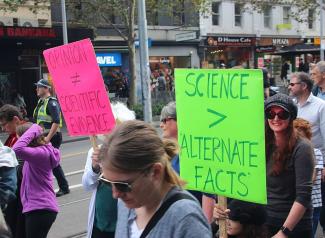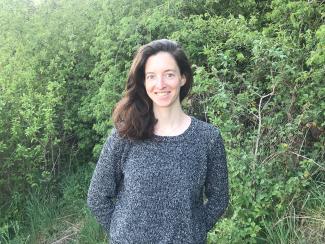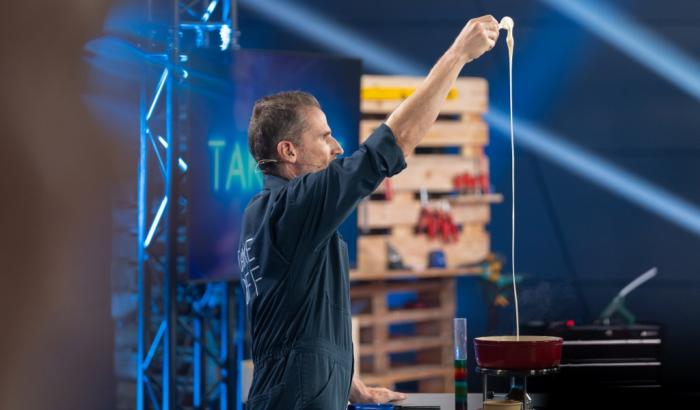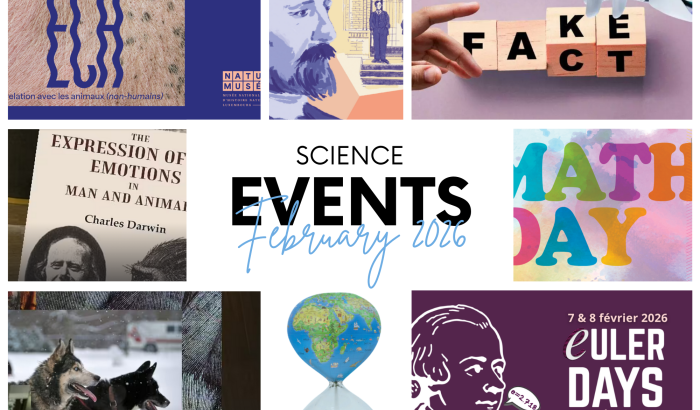
Takver from Australia, CC BY-SA 2.0, via Wikimedia Commons
March for science on 22 April 2017 (Earth Day) in Melbourne
Whether it’s during discussions related to the pandemic, climate change, or other scientific topics, the terms ‘science’ and ‘research’ are often used interchangeably. But they are in fact not the same.
What is the difference between science and research?
Science is the commonly established and accepted knowledge about the world around us, helping us to understand it better; while research is the process based on existing science and leading to new science, by questioning observations, based on existing knowledge, experiments, assumptions…
Sometimes existing science can be proven wrong and is updated through research. For instance, during Middle Age it was assumed that removing blood was the best way to cure most of diseases, before we understood better the human body and found better treatments. Or another example: it took some years before the importance of cleaning hands was recognized, after a doctor observed less deaths in women giving birth if the doctor had cleaned his hands before.
Researchers continue to advance science. Observations, questions and doubts, the confrontation between theory and facts, are the basis of research and are the driving force of science.
Is there a limit to doubt?
It is true that throughout the history of science, theories have evolved several times, and sometimes with high difficulties to fight against a prevailing dogma. Nowadays, better observational tools and greater computational capabilities allow us to provide solid and indisputable evidence for – or against - certain theories. For example, microscopes allow us to actually see the microorganisms that cause diseases, and the advent of microscopes was thus an important step in establishing the now widely accepted germ theory of disease.
However, to this day, there are still scientific principles that no one has ever been able to prove, and yet they are considered true because no one has ever been able to prove them false either. And even better, the devices created based on these principles work perfectly well. Indeed, most of the car engines are based on the first and second principles of thermodynamics, that perpetuum mobile try to invalidate, without any success until now.
Infobox
Thermodynamics is the study of how heat and energy behave. The first principle states that energy cannot be created or destroyed, but it can be transformed from one form into another or transferred from one object to another. In your car engine, heat is converted into motion. The second principle of thermodynamics states that no reaction is 100% efficient: some amount of energy is always lost to heat.
For many years inventors tried to create a machine that could run forever – a so-called perpetuum mobile. However, no design could overcome the slowing effect of friction to date. All machines gradually lose energy, which unfortunately makes perpetual motion impossible – at least until proven otherwise.
So, there is a huge difference between famous scientists such as Galileo fighting against old dogmas or beliefs, and the doubt that some people have today in well weathered principles having physical and successful applications, even if they have not yet been proven correct.
What is the difference between a belief and a fact?
We could distinguish belief and facts by saying that beliefs cannot be proven. However, there are also things that we believe to be true because we feel them and therefore think that this feeling is a proof. But sometimes our senses do not give us a true picture of the facts. For example, when we touch a piece of metal and a piece of plastic that have been in the same room for a while, we are tempted to say that, according to our senses, the metal is colder than the plastic. But when the temperature of the material is measured, it turns out they are at the same temperature!
So, science is very important to understand our senses and facts in general and be able to interpret them correctly. Moreover, it is very important to know how the different scientific facts were discovered [2][3], so that they remain scientific facts and do not become beliefs. [1]
Until when should we trust science?
While sometimes our senses deceive us and only science can help us understand or give us a true representation of reality, sometimes science has also been used to deceive us and distort this reality: to exonerate cigarette industry for instance, or to advocate for a heavy and fatty breakfast [4].
For instance, some people deny the increase in global temperature by focusing on the last 10 years of global temperature records and showing that the curve is almost flat. However, when one looks at the entire dataset over hundreds of years, it shows a clear increase over the last few decades. Others dispute the disappearance of polar bears, because they count the number of bears in a very specific population which is actually growing, probably due to changes in hunting policies, while everywhere else and in total the population is decreasing.
Drowning the audience under numbers and graphs and an apparent scientific method applied to an incomplete or erroneous data set is a good way to divert attention from the real information. And graphs are easily manipulated to make you believe what the author wants you to believe. Just as the point of view (macro or micro) of a photo changes the whole scene, the scale of the axes and the suggested links between variables can lead to very different interpretations of a same fact.
To conclude…
In a nutshell, we can notice that during these times of abundant and easily accessible information for all, science and research have a hard life. It is the responsibility of each one of us to make sure we understand what we share and how it was discovered, and to question, to verify and to multiply the sources of information to avoid being fooled by propaganda disguised under science methods; without falling into the opposite way which consist of doubting everything and taking science for research or the reverse.
Author: Marie-Alix Dalle (University of Luxembourg)
Editor: Michèle Weber (FNR)
Photo: Takver via Wikimedia Commons
Infobox
- Etienne Klein, «Le goût du vrai », https://www.youtube.com/watch?v=2byu0bYPj0c&ab_channel=CEARecherche
- Une histoire de tout ou Presque, Bill Bryson
- Sapiens, Yuval Harari
- La fabrique de l’ignorance, ARTE"
- https://en.wikipedia.org/wiki/Bloodletting
- https://www.theguardian.com/world/2020/mar/18/keep-it-clean-the-surprising-130-year-history-of-handwashing
- https://skepticalscience.com/global-cooling.htm
- https://www.lemonde.fr/les-decodeurs/article/2019/06/18/non-le-nombre-d-ours-polaires-n-est-pas-en-augmentation_5478083_4355770.html




